-
Cedar Waxwing
A lucky observer may sometimes spot a group of sleek-looking Cedar Waxwings perched on a tree branch in a long row, politely passing a berry from beak to beak, up and down the line. This charming sight reflects the bird's… Read More »
-
Spotted Towhee
Ornithologist Edward Forbush commented in 1929: "[The Towhee] is a ground bird — an inhabitant of bushy land. No other sparrow seems to be so wedded to life in thicket and tangle…." Like other sparrows such as the Saltmarsh and… Read More »
-
American Goldfinch
"The goldfinch is an active little bird, always in the best of spirits," observed noted naturalist Arthur Cleveland Bent early in the 20th century. "It has a definite personality exemplifying light-hearted cheerfulness, restlessness, sociability, and untiring activity." Famed ornithologist Roger… Read More »
-
Golden-crowned Kinglet
The tiny Golden-crowned Kinglet is one of the world’s smallest perching birds. At only five grams (about the weight of two pennies), it's not much larger than a Ruby-throated Hummingbird. Its genus name, Regulus, means “little king,” and refers to… Read More »
-
MacGillivray's Warbler
The MacGillivray's Warbler spends most of its time lurking in dense underbrush, like its close relative, the Kentucky Warbler. When this western warbler pops into view, birders identify it by its bright yellow underside, greenish upperparts, and gray hood, with… Read More »
-
Purple Finch
Described by American ornithologist Roger Tory Peterson as "a finch dipped in raspberry juice," the male Purple Finch is a treat for any birder to see. Its genus name, Haemorhous, is slightly less appetizing, as “haemo” is Greek for blood,… Read More »
-
Ocellated Turkey
The Ocellated Turkey is the gaudier tropical cousin of the world’s only other turkey species, our familiar Thanksgiving bird. Watching a strutting male display is like seeing a Wild Turkey through a colorized filter: The baby-blue head is dotted with… Read More »
-
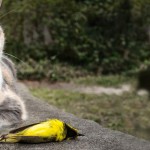
Birds at Risk
More than one-third of the Americas’ 340 migratory species are birds at risk, suffering measurable declines in population. What’s behind these losses? There is consensus, if inadequate data, that habitat loss is the greatest threat to birds. Habitat loss is accelerating in… Read More »
-
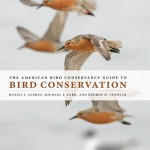
American Wild Birds in Trouble; New Book Provides Hope for Future
For Immediate Release Contact: 202-234-7181 ext.210 The American Bird Conservation Guide to Bird Conservation is now on sale through all major retailers. (Washington, D.C., November 4, 2010). As populations of many American bird species continue to decline, hope stems from… Read More »
-

Migrating Birds Arriving Early
Blue-grey Gnatcatcher by Owen Deutsch (Washington, D.C., March 26, 2012) The warmer weather that much of the nation has been enjoying has brought out the springtime clothes a bit ahead of schedule and has also triggered the earlier-than-normal arrival of… Read More »
-
Swamp Sparrow
The Swamp Sparrow, like the Song Sparrow, is often dismissed as a "little brown job." But a closer look reveals a bird richly colored in earthy tones of russet, brown, and cool gray, set off by a white throat and… Read More »
-
Dark-eyed Junco
“There is not an individual in the Union who does not know the little Snow-bird,” declared John James Audubon, writing about the Dark-eyed Junco almost 200 years ago. Many people in the United States today still think of this familiar… Read More »
-
Townsend's Shearwater
This eye-catching black-and-white seabird is closely related to Newell's Shearwater of Hawai'i, from which it was split in 2015. These lookalike species "shear" or closely skim the ocean surface as they fly, a flight style shared by the Pink-footed Shearwater… Read More »
-
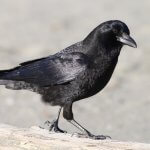
American Crow
The American Crow is widespread in North America and, like the Blue Jay, is often maligned and misunderstood. In folklore, the crow is sometimes associated with witchcraft and evil, or is thought to signify misfortune and even death. One popular… Read More »
-
Hawaiian Common Gallinule (‘Alae ‘Ula)
Like the ‘Io (Hawaiian Hawk) and ‘Ua‘u (Hawaiian Petrel), the ‘Alae ‘Ula, or Hawaiian Common Gallinule, is revered in folklore. According to legend, this bird brought fire from the gods to the people, burning its white forehead red in the… Read More »
-
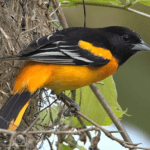
Fading Symbols: These Five State Birds Are in Trouble
U.S. grasslands that once resounded with the boisterous song of the Western Meadowlark are growing silent as numbers of the famed singer decline. This situation, distressing as it is, isn’t unique: A number of state birds have experienced major population… Read More »
-
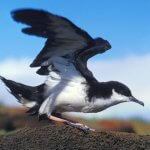
Newell's Shearwater (ʻAʻo)
The low, moaning call of the Newell’s Shearwater gives this small black-and-white seabird its onomatopoeic Hawaiian name ʻAʻo. First described by ornithologist Henry Henshaw in 1900, the elusive bird was declared extinct in less than ten years, then was rediscovered… Read More »
-

Birds of Virginia: Waterbirds
Waterbirds are among Virginia’s superlative birds, including some of the largest (pelicans and swans), most colorful (ducks), most ornamentally plumed (egrets and herons), and most exciting to watch (skimmers skimming, terns diving, ibises flapping over marshes at sunrise or sunset).… Read More »
-
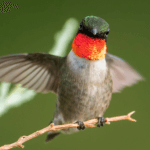
Birds of Virginia: Backyard Birds
Most birders in Virginia start watching birds around their homes. The following species can be seen almost anywhere in the state, often in cities and towns. While some of the bird species included here are among the most common birds… Read More »
-

Nutcrackers, Chisels — and Air Conditioners?! The Diverse World of Bird Beaks
What is a bird beak? Is it just a funny-looking version of a nose, or is it something else entirely? Toco Toucan. Photo by Daniel-Alvarez/Shutterstock. Birds use their beaks for a wide variety of functions, including communication and defense, as… Read More »












































